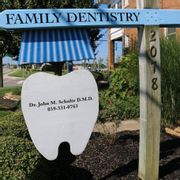A Guide to Receding Gums

While you may believe that general dentistry is only concerned with your teeth, your dentist also places a high focus on gum health. Gum recession is a common condition that often occurs when the gums pull upward away from the teeth, exposing the roots. While this may not seem like a significant issue, it can increase the risk of bacterial development. The following guide outlines what you need to know about this ailment.
4 FAQ About Receding Gums
What is a receding gumline?
Gum recession is a progressive condition in which the gum tissue that surrounds the teeth recedes. It gradually exposes more of the tooth's root, which contains nerve endings and sensitive tissue. Receding gums is a common problem, although most people are unaware it's happening until it's late in the process. Fortunately, dentists can diagnose and cure the issue.
What causes receding gums?

Gum recession can be caused by a variety of factors, including lifestyle choices, family history, and certain health issues. For instance, brushing too vigorously can wear away the gums. Smoking and not practicing good oral hygiene can also contribute to this condition. You can lower your risk of gum recession by quitting smoking and committing to brushing twice daily and flossing once a day.
What are the symptoms?
When the gums recede, the affected tooth will appear longer than normal because the gums have pulled away from the surface. Additionally, bacterial accumulation can cause teeth to become loose, as the buildup will erode the piece of the bone that holds the tooth in place. Additionally, the teeth will become particularly sensitive to heat and cold if too much of the root is exposed.
How do dentists treat this condition?
In milder situations, dentists might do a comprehensive cleaning and prescribe medications to eliminate bacteria and avoid illness. Deep cleaning sessions will clear away plaque and tartar from the teeth. Below the gumline, the exposed root surfaces are smoothed off, making it more difficult for germs to cling to the tooth.
Alternatively, severe gum recession may require surgery if the exposed bone is too deep to clean adequately. Dentists may also perform grafts, where they take tissue from the roof of the mouth or another area to cover the exposed root and protect it from further damage.
If you think you may have receding gums, turn to John M. Schulte, DMD, in Covington, KY. This reputable dentist is proud to offer residents throughout northern Kentucky and Greater Cincinnati, OH, a broad range of oral health care services and products. Whether you need dentures, retainers, teeth whitening, orthodontics, or cavity fillings, the team at this office can help. They're dedicated to creating a welcoming and anxiety-free environment. Call (859) 331-0763 to schedule an appointment, or visit the website to learn more.
About the Business
Have a question? Ask the experts!
Send your question

